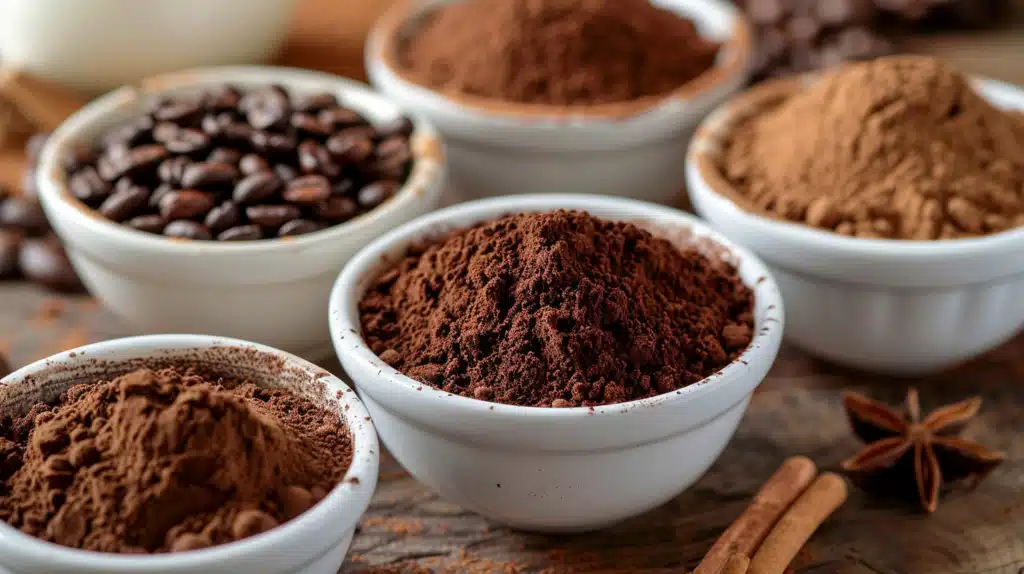Are you a coffee lover trying to reduce caffeine but still craving that rich, creamy cappuccino taste?
You’re not alone. Many people find themselves in the same situation, wanting to enjoy their favorite coffee drink without the jitters and sleepless nights that often come with caffeine.
The good news is that caffeine-free cappuccino offers the perfect solution.
In this article, we’ll explore 12 compelling reasons why caffeine-free cappuccino is the ideal choice for coffee enthusiasts who want to savor the flavor and aroma of a classic cappuccino without the unwanted side effects of caffeine.
From improved sleep quality to reduced anxiety and better overall health, discover how switching to a caffeine-free alternative can improve your coffee-drinking experience.
What is Decaf Coffee?

Decaffeinated coffee, or decaf, has had at least 97% of its original caffeine content removed.
This process is done before the coffee beans are roasted, ensuring that the final product contains only trace amounts of caffeine.
The main reason for decaffeinating coffee is to allow people to enjoy the taste and aroma of coffee without the stimulating effects of caffeine.
This is particularly beneficial for individuals who are sensitive to caffeine or have health concerns that require them to limit their caffeine intake, such as anxiety, insomnia, or high blood pressure.
Nutrition of Decaf Cappuccino
| Nutrient | Content | Health Benefits |
|---|---|---|
| Calories | 0-2 per 8 oz cup (depending on brewing method) | Minimal energy contribution, suitable for weight management |
| Antioxidants | Chlorogenic acids, melanoidin | Reduce inflammation, manage oxidative stress, potential anti-cancer effects |
| Magnesium | About 7 mg per 8 oz cup | Supports muscle and nerve function, heart rhythm, and immune system |
| Potassium | 116 mg per 8 oz cup | Helps control blood pressure, counteracts sodium’s effects on blood pressure |
| Niacin (Vitamin B3) | 0.7 mg per 8 oz cup | Aids in digestion, skin health, and nervous system function |
| Folate | About 4.7 µg per 8 oz cup | Essential for making DNA and other genetic material, supports fetal development during pregnancy |
Health Benefits of Caffeine-Free Cappuccino
1. Heart Health
Recent studies have shown that drinking decaffeinated coffee may help lower the risk of various heart conditions.
This is believed to be due to the high antioxidant content in decaf coffee, which helps reduce oxidative stress and inflammation in cardiovascular tissues.
Decaffeinated coffee contains a range of antioxidants, including chlorogenic acids, which have been shown to contribute to heart health.
These antioxidants help improve blood vessel function by increasing nitric oxide production, which in turn helps lower blood pressure.
2. Reduced Risk of Type 2 Diabetes
Several studies have indicated that drinking decaffeinated coffee may help lower the risk of developing type 2 diabetes.
A large-scale study published in the Archives of Internal Medicine found that individuals who drank six or more cups of decaf coffee daily had a 33% lower risk of type 2 diabetes than those who did not.
Researchers believe that certain components in decaf coffee, such as magnesium and chromium, can help improve glucose metabolism and insulin sensitivity.
3. Liver Health
Consuming decaffeinated coffee has been linked to lower liver enzyme levels, which indicates reduced liver inflammation and damage.
A study published in the journal Hepatology found that individuals who drank three or more cups of decaf coffee daily had a 25% lower risk of developing liver disease than those who did not.
The protective effects of decaf coffee on liver health are thought to be due to its high content of antioxidants and anti-inflammatory compounds.
4. Weight Management
While decaffeinated coffee does not contain caffeine’s metabolism-boosting effects, it still contains other compounds that may aid weight management.
Chlorogenic acid, one of the main antioxidants in decaf coffee, has been shown to help moderate blood sugar levels and reduce fat absorption from the diet.
A study published in the Journal of Nutrition found that individuals who consumed coffee rich in chlorogenic acid experienced a significant reduction in body weight and body fat percentage over 12 weeks.
5. Cancer Prevention
Some studies suggest that drinking decaffeinated coffee may be associated with a lower risk of certain types of cancer.
A study published in the journal Cancer Epidemiology, Biomarkers & Prevention found that individuals who drank two or more cups of decaf coffee per day had a 48% lower risk of developing colorectal cancer than those who did not drink coffee.
The high antioxidant content in decaf coffee is believed to play a role in its potential cancer-preventive properties.
6. Improved Mental Health
Decaffeinated coffee contains several compounds that may provide neuroprotective effects, potentially reducing the risk of cognitive decline and protecting against neurodegenerative diseases such as Alzheimer’s and Parkinson’s.
A study published in Frontiers in Neuroscience found that a specific compound called phenyl indane, formed during the roasting process of coffee beans, may help prevent the buildup of toxic brain proteins associated with Alzheimer’s disease.
While more research is needed, drinking decaf coffee may benefit brain health.
Lifestyle Benefits of Caffeine-Free Cappuccino
7. Better Digestion
Decaffeinated coffee generally has a lower acidity level compared to regular coffee.
This reduced acidity can help alleviate stomach discomfort and acid reflux, making it a more suitable choice for individuals with sensitive stomachs.
The lower acid content in decaf coffee is due to the decaffeination process, which removes some of the acidic compounds along with the caffeine.
Due to its gentler nature, decaffeinated coffee is less likely to irritate the digestive system. This can help maintain a healthier digestive tract, reducing the risk of stomach ulcers and gastrointestinal inflammation.
8. Sleep Quality
Numerous studies have shown that eliminating or reducing caffeine intake can significantly improve sleep quality and duration.
Caffeine is a stimulant that can stay in your system for several hours, affecting your ability to fall asleep and maintain a deep, restful sleep.
By opting for decaffeinated coffee, especially in the later hours of the day, you can minimize the impact of caffeine on your sleep cycle, allowing for more restorative and uninterrupted sleep.
9. No Caffeine Side Effects
One of the most common side effects of caffeine consumption is the jitteriness and nervousness that some people experience.
These jitters can lead to increased anxiety, restlessness, and even panic attacks in some individuals.
By choosing decaffeinated coffee, you can enjoy your cappuccino without the risk of these unpleasant side effects, promoting a more calm and relaxed state of mind.
Decaffeinated coffee provides a more stable energy source without the highs and lows associated with caffeine.
This can help maintain consistent energy levels, promote better focus, and reduce feelings of fatigue.
10. Skin Health
Reducing caffeine intake may benefit your skin health, particularly regarding collagen production.
Collagen is a vital protein that helps maintain skin elasticity and firmness, reducing the appearance of fine lines and wrinkles.
Some studies suggest that high caffeine consumption may interfere with collagen synthesis, leading to premature aging of the skin.
Decaffeinated coffee can support your body’s natural collagen production, promoting healthier, more youthful-looking skin.
In addition to supporting collagen production, reducing caffeine intake can contribute to better skin hydration.
Caffeine has a diuretic effect, leading to increased fluid loss and dehydration. When dehydrated, skin can appear dull, dry, and more prone to wrinkles.
Practical Advantages of Caffeine-Free Cappuccino
11. Versatility in Flavors
One of the great things about caffeine-free cappuccinos is that they come in various flavors, catering to diverse taste preferences.
A decaf cappuccino suits every palate, from classic vanilla and hazelnut to more unique options like caramel and cinnamon or seasonal flavors like pumpkin spice.
This versatility ensures that you can enjoy the taste and aroma of your favorite cappuccino without compromising on flavor due to the absence of caffeine.
12. Accessibility
Decaffeinated coffee is an excellent option for many people, including those with specific health conditions or dietary restrictions.
Pregnant women, for example, are often advised to limit their caffeine intake to protect the health of their developing baby.
Similarly, individuals with hypertension, anxiety disorders, or certain cardiac conditions may need to avoid or reduce their caffeine consumption.
Decaf cappuccinos provide a safe and enjoyable alternative, allowing individuals to still enjoy the pleasure of a creamy, frothy coffee drink without the potential risks associated with caffeine.
Decaf Coffee vs. Caffeinated Coffee
| Aspect | Decaffeinated Coffee | Caffeinated Coffee |
|---|---|---|
| Caffeine Content | 2-5 mg per 8 oz cup | 80-100 mg per 8 oz cup |
| Calories | 0-2 per 8 oz cup (depending on brewing method) | 0-2 per 8 oz cup (depending on brewing method) |
| Antioxidants | Chlorogenic acids, melanoidins | Chlorogenic acids, melanoidins |
| Magnesium | About 7 mg per 8 oz cup | About 7 mg per 8 oz cup |
| Potassium | 116 mg per 8 oz cup | 116 mg per 8 oz cup |
| Niacin (Vitamin B3) | 0.7 mg per 8 oz cup | 0.7 mg per 8 oz cup |
| Folate | About 4.7 µg per 8 oz cup | About 4.7 µg per 8 oz cup |
| Health Impact | Reduced risk of anxiety and sleep disruption, lower acid content | Higher risk of anxiety, sleep disruption, greater stimulation |
| Suitability | Preferred by those sensitive to caffeine, pregnant women, or those with certain health conditions | Preferred by those needing increased alertness or focus |
Methods of Decaffeination Process

1. Solvent-Based Process
In this method, solvents like methylene chloride or ethyl acetate dissolve the caffeine. The green coffee beans are steamed, causing their pores to open.
Then, the beans are repeatedly rinsed with the solvent, which binds to the caffeine and extracts it from the beans. Finally, the beans are steamed again to remove any residual solvent.
2. Swiss Water Process
This chemical-free method uses only water, coffee oils, and activated charcoal to decaffeinate the beans. The beans are soaked in hot water, which extracts the caffeine and flavor compounds.
The water is then passed through a charcoal filter, which traps the caffeine molecules while allowing the flavor compounds to pass through.
The filtered water is then used to soak a new batch of beans, which absorbs the flavor compounds without the caffeine.
3. CO2 Process
The CO2 process involves using liquid carbon dioxide under high pressure to extract caffeine from the beans.
The green coffee beans are soaked in water and placed in a stainless steel container. Liquid CO2 is forced into the container, where it binds with the caffeine molecules.
The caffeine-laden CO2 is then removed, leaving behind the decaffeinated beans.
This method is highly effective at preserving the coffee’s flavor and is primarily used for large-scale commercial decaffeination.
Homemade Caffeine-Free Cappuccino Mix Recipe

1. Ingredients Needed
To create a delicious and healthier homemade caffeine-free cappuccino mix, you’ll need the following ingredients:
- 1 cup decaffeinated coffee powder (choose a high-quality, naturally decaffeinated coffee for best results)
- 1/4 cup unsweetened cocoa powder (optional for a richer chocolate flavor)
- 1/4 cup natural sweetener of your choice (e.g., stevia, monk fruit sweetener, or raw honey)
- 1/2 cup dried milk powder or plant-based milk powder (such as coconut milk powder or soy milk powder)
- 1/2 tsp ground cinnamon (optional, for added warmth and flavor)
2. Steps to Prepare
- In a large mixing bowl, combine the decaffeinated coffee powder, cocoa powder (if using), natural sweetener, milk powder, and ground cinnamon (if using).
- Mix the ingredients with a whisk or fork until they are well combined and there are no lumps.
- Transfer the mixture to an airtight container, like a glass jar with a tight-fitting lid.
- Label the container with the date and contents, and store it in a cool, dry place away from direct sunlight. The mix should keep well for up to 6 months when stored properly.
3. How to Serve
To make a delicious caffeine-free cappuccino using your homemade mix, follow these simple steps:
- Heat 1 cup (8 oz) of water or milk in a saucepan or using a milk steamer until it is hot and steaming. You can also froth it using a milk frother or vigorously whisking it in a saucepan.
- Add 2-3 tablespoons of the caffeine-free cappuccino mix to a mug, depending on your preferred strength and sweetness.
- Pour the hot water or steamed milk over the mix, stirring well to combine and dissolve any lumps.
- If desired, top your cappuccino with a sprinkle of cinnamon, nutmeg, or unsweetened cocoa powder for added flavor and visual appeal.
- Enjoy your delicious, creamy, and caffeine-free cappuccino!
Tip: Increase the decaffeinated coffee powder for a stronger coffee flavor. Adjust the amount of sweetener or milk powder to suit your taste preferences for a sweeter or creamier cappuccino. Feel free to experiment with different ratios to find your perfect homemade caffeine-free cappuccino blend!
Wrapping It Up
Caffeine-free cappuccino offers a delightful and healthy alternative for coffee lovers who want to enjoy the rich, creamy taste of cappuccino without the potential side effects of caffeine.
By choosing decaf, you can reap numerous health benefits, from improved heart health and reduced risk of type 2 diabetes to better sleep quality and digestion.
Plus, with the added lifestyle benefits and the ease of making your homemade mix, there’s never been a better time to embrace the world of caffeine-free cappuccinos.
So why not try it and discover a new way to savor your favorite coffee drink?
Your taste buds and your body will thank you.
If you’re ready to switch, check out our simple caffeine-free cappuccino mix recipe and enjoy the benefits today!
Frequently Asked Questions
Are Caffeine Free Drinks Good for You?
Caffeine-free drinks can be good for you. They offer health benefits without the side effects of caffeine, such as improved sleep and reduced anxiety.
What are the Negatives of Decaf Coffee?
Decaf coffee may contain small amounts of caffeine and is slightly more acidic than regular coffee, which can cause digestive issues for some people.
How Long Does It Take to Detox from Caffeine?
Caffeine detox usually takes 2-9 days, depending on your usual intake. Symptoms like headaches, fatigue, and irritability are common but subside as your body adjusts.




